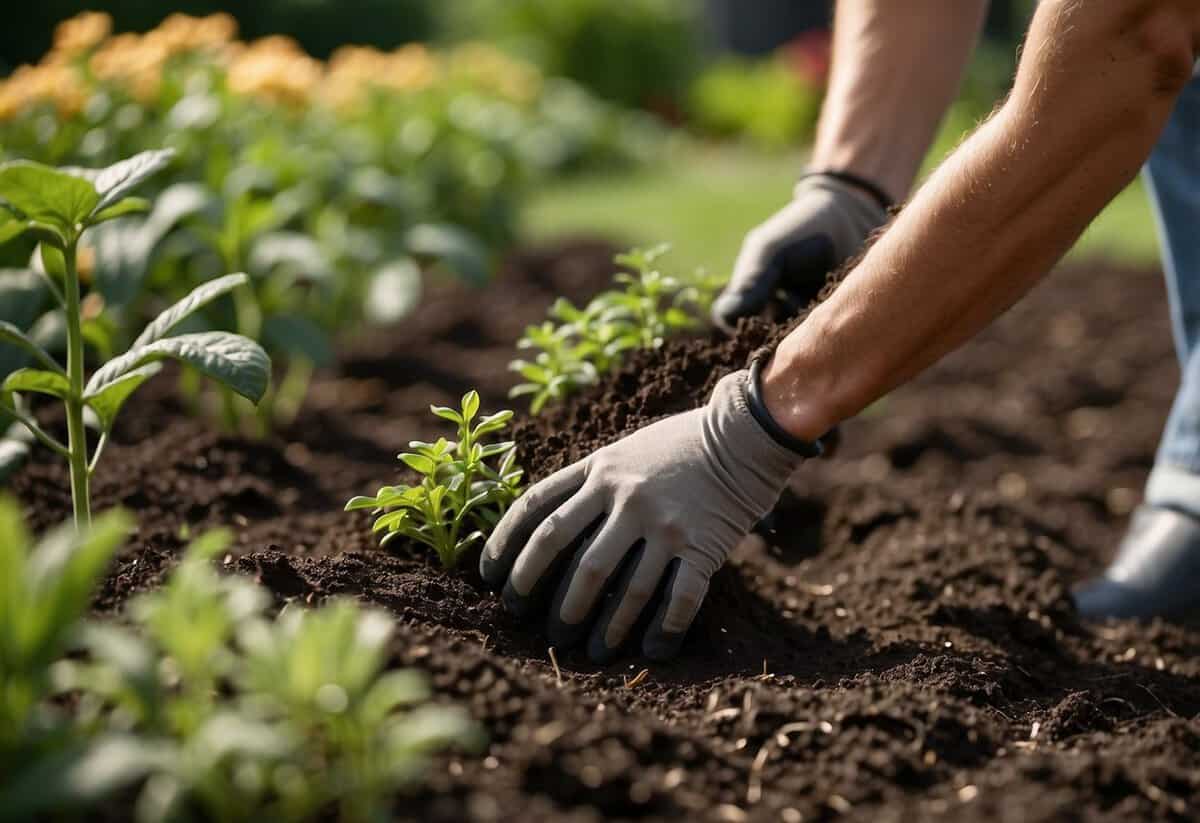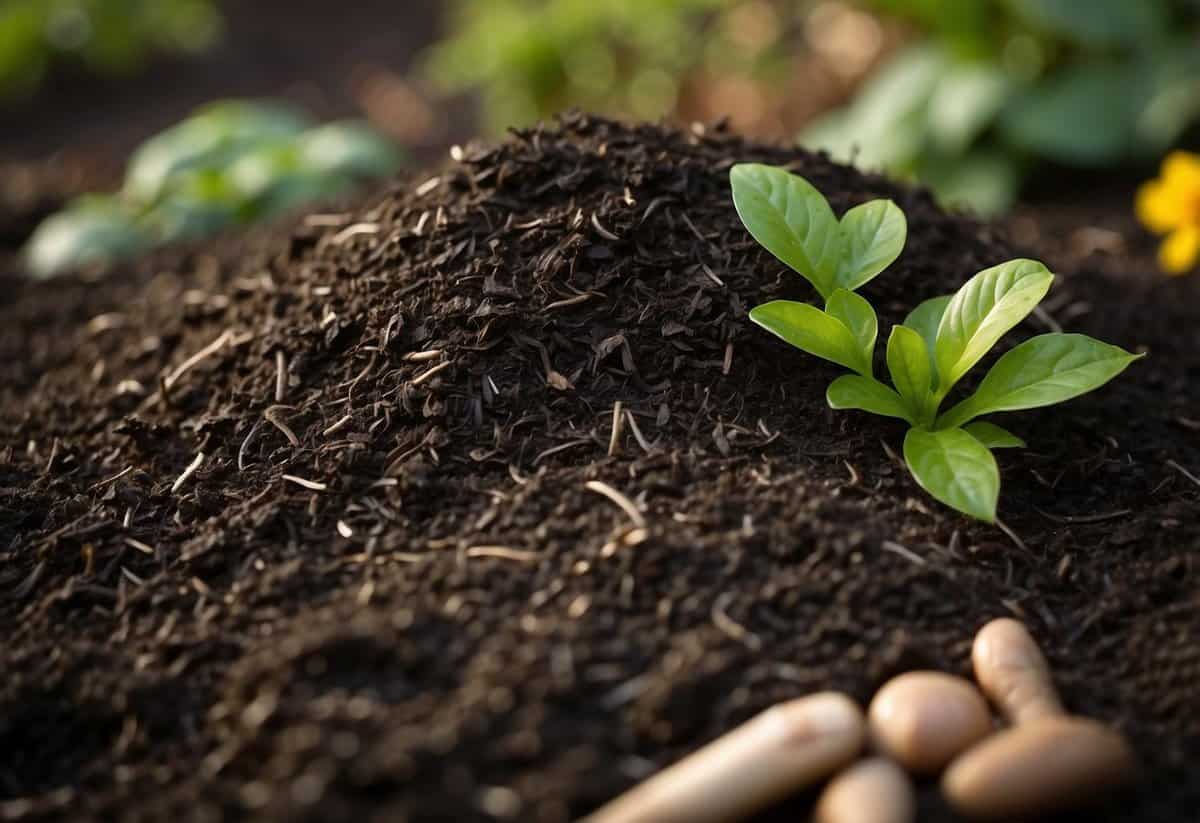Gardening Mulch Tips: Transform Your Garden with Ease
Gardening mulch is a crucial element in maintaining a healthy and vibrant garden. By choosing the right type of mulch, you can greatly improve the moisture retention and weed control in your garden beds. Mulch helps keep your plants healthier and your garden looking its best.

There are many different types of mulch available, each with its own benefits. Whether you use organic materials like wood chips and straw or inorganic options like gravel, understanding the basics of mulching can make all the difference in your gardening success.
1) Choose the Right Mulch

Picking the right type of mulch is key to a healthy garden. Organic mulches like wood chips, straw, or grass clippings help improve soil quality over time. They add nutrients as they decompose, keeping your plants strong and healthy.
Inorganic mulches, such as stones or rubber, last longer but don’t provide the same soil benefits. Consider your garden’s needs when selecting mulch. For more tips, check out Better Homes & Gardens.
2) Use newspaper layers for weed control

Using newspaper layers to control weeds is a simple and natural method. Lay down 2-3 sheets of newspaper at a time on the soil surface. This blocks the sunlight and prevents weeds from growing.
After laying the newspaper, wet it to help it stay in place. Then, add a layer of mulch on top for extra protection. This not only keeps weeds at bay but also helps conserve moisture in the soil.
For more details, check out this guide on using newspaper to prevent weeds naturally.
3) Cedar mulch for pest deterrent

Cedar mulch is great for keeping pests away from your garden. The natural oils in cedar, like cedrol and thujone, are known to repel insects.
By using cedar mulch, you can reduce the number of harmful bugs. This means fewer pests bothering your plants. It’s a simple way to protect your garden while keeping it healthy.
For more information, you can visit Leafy Place or check out Epic Gardening.
4) Redwood Bark for a Decorative Touch

Redwood bark adds a natural and attractive look to any garden. This type of mulch has a unique reddish-brown color that can make your plants stand out.
It helps retain moisture, keeping your soil hydrated longer. Redwood bark mulch is also effective at suppressing weed growth, meaning you spend less time weeding.
In addition to its practical benefits, redwood bark can be used around garden beds, paths, and tree bases to enhance your yard’s appearance. Just spread it 1 to 3 inches deep for the best results.
5) Grass clippings to enrich the soil

Grass clippings are a simple way to add nutrients back into your garden soil. When grass breaks down, it releases nitrogen, potassium, and phosphorus, which are essential for plant growth.
Spread a thin layer of grass clippings on your garden beds. This method helps prevent weeds and retains soil moisture.
If using fresh clippings, make sure to lay them thinly to avoid mold. Let them dry out completely before use to avoid matting and heat buildup. This step helps weed seeds die off before you add them to your garden.
6) Bark mulch to retain moisture

Bark mulch is great for keeping soil moist. This helps your plants get enough water and saves you from having to water often.
Using bark mulch can slow down water evaporation. This means the soil stays wet longer.
Covering your garden with a layer of bark mulch keeps the sun off the soil, helping it stay cool and damp.
7) Straw mulch to protect vegetable gardens

Using straw mulch helps keep moisture in the soil. This means you won’t have to water your garden as often. In the hot summer months, this can save you a lot of effort.
Straw mulch also helps reduce weed growth. It covers the soil, blocking sunlight that weeds need to grow. This makes your gardening work a bit easier.
To get the full benefits, apply the straw at least four to eight inches deep. The straw will compress quickly, giving you good coverage. An insulating layer of straw promotes beneficial microbes and helps prevent erosion. You can also water lightly on top of the mulch to keep it in place, especially if you’re using shredded straw mulch which can blow away easily.
Mulching with straw can help improve your garden’s health and make your garden tasks a bit simpler.
8) Compost Mulch for Nutrient Boost

Using compost as mulch can give your garden a nutrient boost. Compost is rich in essential nutrients like nitrogen, phosphorus, and potassium.
When you spread 1 to 3 inches of compost over the soil, it slowly releases these nutrients to your plants.
Compost mulch not only nourishes your plants but also helps retain soil moisture and prevent weed growth. For more details, check out using compost as mulch.
9) Hardwood mulch for long-lasting benefits

Hardwood mulch is a great choice if you want something that lasts. It is known to decompose slowly, giving you long-lasting benefits. This can save you time and effort in reapplying mulch frequently.
You can often find hardwood mulch for a low price or even for free from city utility departments. When it breaks down, it adds valuable nutrients to your soil.
Hardwood mulch also helps to protect your plants by keeping the soil moist and reducing weed growth. This means healthier, happier plants in your garden.
10) Peat Moss as a Soil Conditioner

Peat moss is great for improving your garden soil. It helps retain moisture and increases soil acidity, which is beneficial for certain plants.
To use peat moss, mix it into the top few inches of your garden soil. This ensures even distribution.
Peat moss can help prevent soil compaction, allowing roots to breathe better. This promotes healthier plant growth. Make sure not to overuse it, as too much peat moss can hinder water and air circulation. For detailed instructions, check out how to mix peat moss into soil.
Benefits of Using Mulch

Mulch provides important benefits for your garden. It helps retain soil moisture, reduces soil erosion, and suppresses weed growth.
Retains Soil Moisture
Mulch acts like a protective blanket over your soil. This helps keep the moisture in the soil by reducing evaporation. You will not have to water your plants as often, which saves water and time.
Organic mulches like straw, leaves, and grass clippings break down over time. They add nutrients to the soil, improving its structure and ability to hold water. This is especially helpful during hot, dry periods when water is scarce.
When using mulch, apply it evenly to a depth of 2-4 inches around your plants, but keep it a few inches away from the stems to prevent rot.
Reduces Soil Erosion
One important benefit of mulch is its ability to reduce soil erosion. When rain or wind hits bare soil, it can wash or blow the top layer away. Mulch protects the soil by breaking the force of rain and wind, keeping the soil in place.
Mulch also helps maintain soil structure by protecting it from compaction caused by heavy rain or foot traffic. This results in better root growth and healthier plants. Using materials like wood chips or bark works well for erosion control on slopes and around trees and shrubs.
By reducing erosion, mulch helps keep your garden soil fertile and productive.
Suppresses Weed Growth
One of the best reasons to use mulch is for weed control. Mulch creates a barrier that blocks sunlight from reaching weed seeds, preventing them from germinating and growing. Less weeds mean less competition for water and nutrients for your plants.
Some popular options for weed-suppressing mulch include bark chips, straw, and shredded leaves. Apply mulch in a layer that is 2-4 inches thick to effectively block most weeds.
When weeds do appear, they are often easier to pull out because the mulch keeps the soil underneath moist and loose. This will reduce how much time you spend weeding and make your garden more enjoyable.
Types of Mulch

Choosing the right mulch can help your garden thrive. You have various options like organic mulches that decompose over time and inorganic mulches that provide long-lasting benefits.
Organic Mulch Types
Organic mulches come from natural materials and improve the soil as they break down. Wood chips are popular because they look nice and decompose slowly, adding nutrients to the soil. Shredded bark is another choice and works well around trees and shrubs.
Compost is rich in nutrients and can be made from kitchen scraps and yard waste. It’s a great option for vegetable gardens. Grass clippings are also useful. Make sure they are free of pesticides before using them as mulch.
Straw is ideal for vegetable gardens and can help keep soil warm. It also reduces weeds and adds organic matter as it decays. Chopped leaves are easy to come by in the fall and can be spread around garden beds to improve soil structure.
Inorganic Mulch Types
Inorganic mulches don’t decompose, so they last longer. Gravel and stones can work well in pathways or around plants that like well-drained soil. While they don’t add nutrients, they help keep the soil cool and reduce weeds.
Plastic mulch is often used in vegetable gardening to warm the soil in spring and reduce weeds. It’s especially helpful in northern climates. Landscape fabric is another option that allows water to reach the soil while blocking weeds.
Rubber mulch is made from recycled tires and is good for playgrounds or paths. It doesn’t decompose and can last for many years. Pumice rock is another durable choice that improves soil aeration and retains moisture, making it useful in dry regions. For more on this, check out this guide on pumice rock mulch.
How to Apply Mulch Correctly

Applying mulch helps retain moisture, regulate soil temperature, and prevent weeds. Follow these steps to ensure your mulch benefits your garden.
Choosing the Right Mulch for Your Garden
Picking the right mulch can make a big difference for your plants. Organic mulches like wood chips, straw, and compost break down and add nutrients to the soil. They are great for vegetable gardens and flower beds.
On the other hand, inorganic mulches like gravel and stone do not decompose. They work well in areas where you don’t want plants, such as walkways or driveways. Avoid using rocks as mulch in garden beds as they can heat up and damage plants.
Consider factors like climate and plant type. For example, in a cold climate, a thicker mulch can help protect plants over winter. Think about what works best for your garden’s needs.
Tips for Effective Mulching
Start by preparing your garden bed. Remove any weeds and lightly dampen the soil. Spread mulch in an even layer about 2-3 inches thick. Too much mulch can suffocate your plants and block water from reaching the roots.
When mulching around trees and shrubs, keep the mulch a few inches away from the trunk to prevent rot. In flower beds, don’t pile mulch directly on the plants. Use a rake to spread the mulch evenly and keep it from clumping.
You can also create small piles and then rake them out for a neat appearance. Reapply mulch yearly to maintain its benefits.







